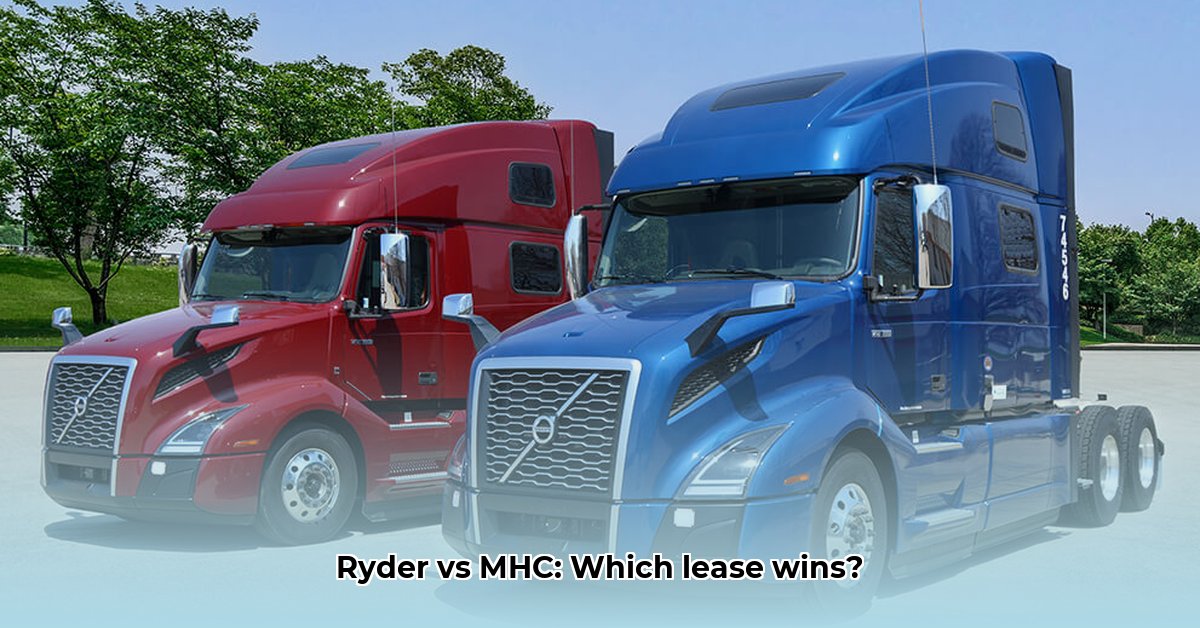
Semi-Tractor Leasing: Ryder vs. MHC - A Comprehensive Guide
Choosing the right semi-tractor lease is critical for trucking businesses. This directly impacts profitability and long-term growth. Ryder and MHC are leading providers, each offering distinct advantages. This guide provides a structured comparison to help you make an informed decision.
Understanding Your Business Needs
Before comparing providers, assess your business: size (solo operator, small fleet, large enterprise), operational style (preference for personalized service vs. standardized processes), and long-term growth plans. These factors shape your leasing needs. Consider your risk tolerance – are you comfortable with potentially higher initial costs for greater flexibility, or do you prioritize predictable monthly expenses?
Ryder: A National-Scale Approach
Ryder, a large-scale provider, offers extensive national coverage and a wide array of leasing options. This is beneficial for large fleets with operations spread across multiple states. Its scale often translates to better negotiating power and potentially more favorable financial terms. However, the emphasis on standardized processes might mean less personalized attention.
Ryder's FlexTrac program, for example, offers flexibility, but a detailed comparison with MHC's offerings (TRAC) is crucial. The program's benefits and drawbacks need careful evaluation relative to your specific operational context. Ryder's investment in electric vehicles is also a noteworthy factor. Assess if this aligns with your sustainability goals and financial capacity.
MHC: Personalized Service and Local Focus
MHC prioritizes personalized service and local relationships. This approach is ideal for smaller trucking operations that value direct contact and tailored support. While lacking Ryder's national reach, MHC's responsiveness and customized solutions can be invaluable.
MHC's TRAC program, for instance, requires direct comparison with Ryder’s FlexTrac. A thorough understanding of each's terms and conditions is essential. This personalized approach might offset the broader resources offered by a national provider like Ryder, depending on your specific operational needs and risk profile.
Key Differences: A Comparative Analysis
The following table summarizes key differences:
| Feature | Ryder | MHC | Considerations |
|---|---|---|---|
| Size & Scale | National, Large Fleet Focus | Regional/Local, Smaller Fleet Focus | Align with your operational area and fleet size. |
| Service Style | Standardized, Efficient | Personalized, Hands-on | Prioritize your needed level of service and support. |
| Financing Options | Diverse Range, potentially better terms | Range may be more limited | Meticulously compare financing terms and conditions. |
| Lease Programs | FlexTrac, others | TRAC, others | Compare terms, conditions, pricing across all programs. |
| Electric Vehicle Focus | Significant investment | Less emphasis explicitly stated | Evaluate alignment with your sustainability goals and budget. |
Choosing Your Lease: A Step-by-Step Guide
Selecting a lease is a multi-step process:
Assess Your Needs: Evaluate your business size, operational needs, risk tolerance, and financial situation. What are your transportation needs, both current and future?
Request Detailed Quotes: Obtain detailed quotes from both Ryder and MHC, clarifying all costs and terms. Don't hesitate to ask questions; detailed information is critical.
Compare Quotes: Analyze quotes side-by-side, comparing lease terms, monthly payments, maintenance coverage, and included services. Project your total costs over the lease period for a comprehensive understanding.
Negotiate: Negotiate lease terms aggressively. A well-negotiated lease can significantly reduce your long-term costs. Leverage market conditions to your advantage.
Review Contracts: Before signing, have a legal professional review the contracts to ensure clarity and address potential risks.
Risk Assessment Matrix
Leasing involves inherent risks. Understanding these helps mitigate negative outcomes:
| Risk Factor | Ryder Potential Exposures | MHC Potential Exposures | Mitigation Strategies |
|---|---|---|---|
| Contract Flexibility | May have less flexibility in early termination | May offer more flexibility | Negotiate favorable termination clauses. |
| Maintenance Cost | Potentially high, depending on plan | Potential variations | Carefully compare maintenance plans and potential hidden costs. |
| Vendor Lock-in | Risk of being locked into a long-term contract | Lower risk, locally-based | Evaluate your exit strategy and alternative providers early on. |
| Technology Obsolescence | Risk of outdated technology | Similar to Ryder | Consider lease terms that allow updates or replacements. |
| Fuel Cost Volatility | Subject to fluctuating fuel prices | Also subject to fuel price changes | Implement fuel efficiency measures; explore alternative fuels. |
Conclusion: Making the Right Choice
The best provider depends on your specific priorities. Ryder offers scale and nationwide reach, while MHC emphasizes personalized service with local expertise. The optimal choice aligns with your business size, operational needs, risk tolerance, and long-term growth strategy. Thorough due diligence, including detailed cost analysis and legal review, is crucial for sustainable success.